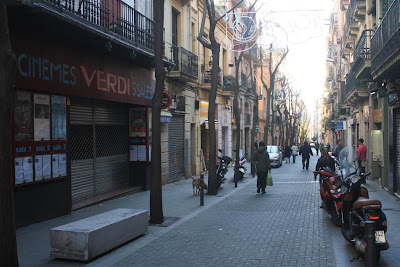Last weekend I enjoyed a route along La Vila de Gràcia, a district in Barcelona which was an independent village until the early twentieth century. Because of that this area of Barcelona has its own personality with a lot of lovely squares connected by narrow and peaceful streets.
Plaça del Diamant, probably the most popular square in Gràcia
The atmosphere in Gràcia is really quiet during the day but it becomes incredibly lively at night, especially at weekends. La Festa Major de Gràcia, which is held for one week from the 15th of August, is actually one of the most popular ones in Barcelona.
Although the origins of this celebration in the nineteenth century is fairly recent, it has grown in importance and now is well known because of the colorful decoration of the streets. The Festa Major de Gràcia receives an annual influx of hundreds of thousands of people from all over Catalonia looking for fun with the lively atmosphere day and night.
Besides, Gràcia has always had an active social and political life and a rich fabric of civic, cultural, artistic and sporting institutions.
The most interesting places you will see along this route are the following ones:
- Casa Vicens (designed by Antoni Gaudí)
- Plaça del Diamant
- Carrer Verdi
- Plaça de la Virreina
- Plaça de la Revolució de Setembre de 1858
- Plaça del Sol
- Plaça de la Vila
- Casa Fuster (a fantastic modernist building)
Casa Vicens
Nice look of the fence of Casa Vicens, designed by the brilliant Antoni Gaudí, located in Carolines street, in Gràcia district
A detail of the iron gate of Casa Vicens, which imitates the shape of Bargalló leaves, a common plant in Gràcia
Casa Vicens is structured in four levels or floors: a basement to be used as a cellar, two floors for housing and a loft for the service. The extensive use of ceramics in the facade gives the building a colorful look, one of the essential features of this modernist building
Balconies and window railings of Casa Vicens were carefully designed by Antoni Gaudí
Plaça del Diamant
In Plaça del Diamant there are always children playing soccer. Under this square a bunker of the Spanish Civil war can be visited
Carrer Verdi
Carrer Verdi is a typical and emblematic pedestrian street in Gràcia. Here, as you can see in this picture on the left, you can find the Verdi cinema, where you can watch films in original version
Plaça de la Virreina
Plaça de la Virreina, being in the center of Gràcia district, is usually quite busy and some sunday mornings markets are organized where you can find for sale almost any imaginable second hand item, usually handicraftsman
Main entrance to Sant Joan church behind Font de Ruth sculpture in Plaça de la Virreina
Sant Joan church in Plaça de la Virreina
Balconies of wrought iron of a modernist building located next to Plaça de la Virreina
Plaça de la Revolució de Setembre de 1858
Under Plaça de la Revolució de Setembre de 1858 in Gràcia I could visit another bunker of the Spanish Civil War
Plaça del Sol
Plaça del Sol is another lovely square in Gràcia
Squares in Gràcia, like Plaça del Sol, are fantastic places for a drink
Plaça de la Vila de Gràcia
Main facade of the city hall of Gràcia district, located in Plaça de la Vila
Clock tower in Plaça de la Vila de Gràcia
Casa Fuster
Casa Fuster is a modernist building designed by Lluís Domenech i Montaner between 1908 and 1910. It is located on Passeig de Gràcia, next to Avinguda Diagonal. It was converted into a luxury hotel in 2004
A detail of the white facade of Casa Fuster, made of marble
If you liked this route, I suggest you more routes you can do in Barcelona:
- Marina and beach route
- Modernist route
- Raval route
- Montjuïc route
- Shopping route in Passeig de Gràcia
Finally, clicking on the next link you will find links to other beautiful places in Barcelona, among them, more nice districts like, for example, the Gothic Quarter.


















No hay comentarios:
Publicar un comentario